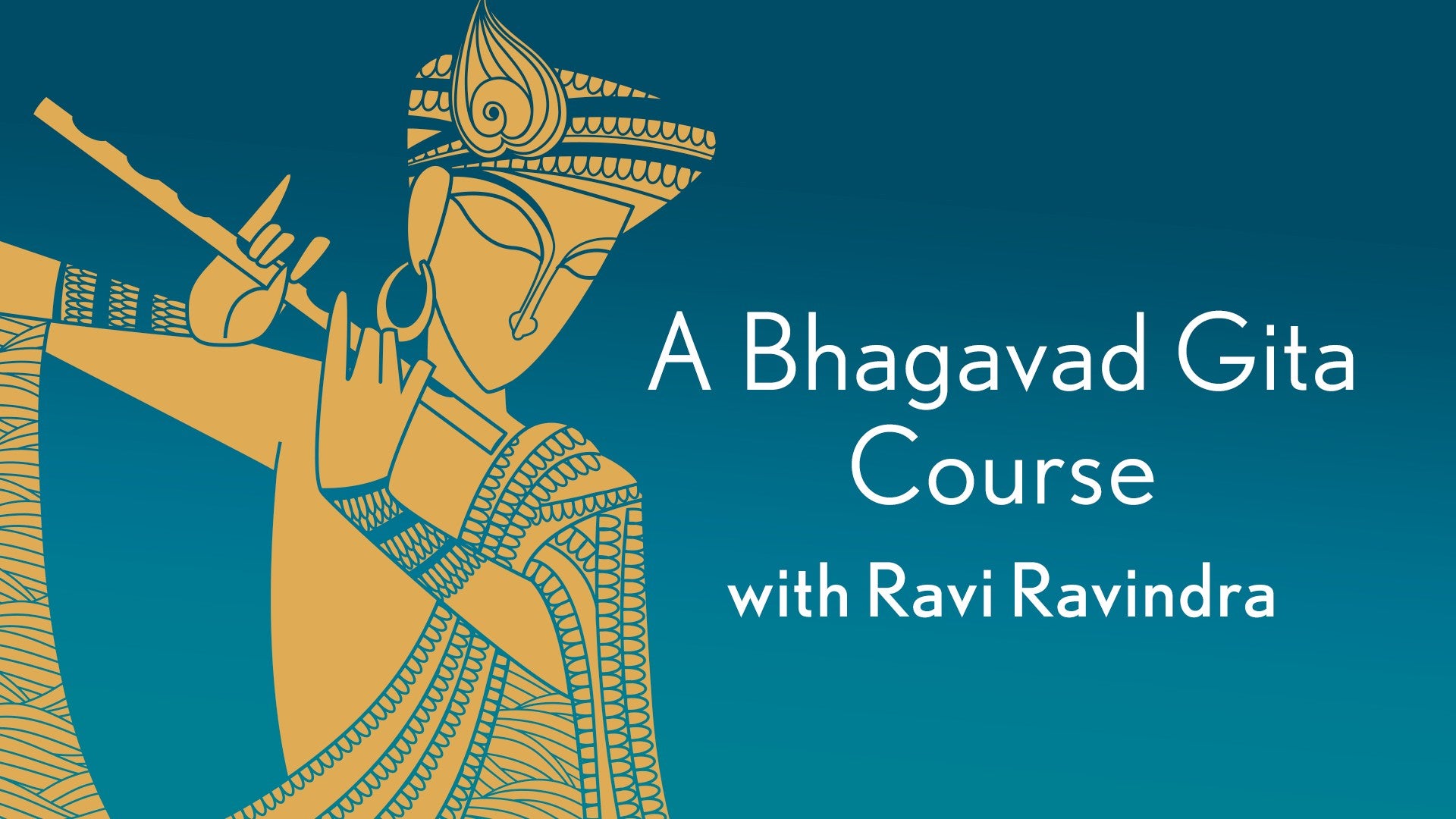Description
About This Video
Transcript
Read Full Transcript
Meditation
So, bring our attention to inside, because we are not now required to attend to anything outside. As we know, the very strong suggestion that our ordinary mind needs to be quiet, so that we can become aware of something subtler than what the mind can figure out. Where the mind is very mobile, in order to assist it to stay here, we now try to connect it with the body, which is much more stable. So, to begin with, try to sense the vertical axis in the body from the top of the head to the base of the spine. In traditional spiritual literature, especially in yoga theory, this is called the world axis or the axis mundi.For the time being, if I cannot actually sense this, I simply imagine that such an axis exists. And it is not something wholly confined to my physical body. It is almost as if it passes through me as it does through every other person. When I try to connect my mobile mind to this vertical axis, not very rigidly, not at one particular point, because not accustomed to being quiet, it will rebel. So I allow the movement of the mind up and down the axis, but use a certain amount of willpower to not let it get away from the axis.
And gradually, without artificially forcing anything, I move towards a coordination of the movement of the mind up and down the axis, coordinating with breathing in and breathing out. As I breathe out, the mind can go down the axis. And as I breathe in, it can move up the axis. I don't try to hold it anywhere, I don't hold my breath outside or inside. But because I am naturally now bringing some attention to my breathing, as I become aware of it, the quality of that breathing naturally changes.
It becomes a little deeper and therefore the movement of the mind coordinated with this temple becomes slower. And it is always a good reminder that I need to remain relaxed. If I find any parts of my body, maybe even my hands or shoulders or forehead, have become tense, I intentionally relax them. If my mind wanders away, I don't need to be upset or annoyed. That is its natural tendency.
So more or less with affection, but some firmness, I bring it back to the axis. It is always a good reminder that it is always a good reminder that it is always a good reminder that it is always a good reminder that it is always a good reminder that it is always a good reminder that it is always a good reminder that it is always a good reminder that it is always a good reminder. Now keeping the mind connected with this axis, I pay special attention to different parts of the axis. For example, I now pay attention to the head. Breathing is taking place.
I don't need to do anything about it, but my mind can now be more interested. And how do I feel what is taking place in the head, not what I am thinking, but do I sense more space there? And especially because the ordinary mind is much more interested in differences, I invite it to see if the sense of clarity or sense of illumination is more in the front of my head or in the back or on the sides. I am just simply watching the head space. And then gradually I move my attention to the back.
Still breathing in and breathing out. Again the mind will be more interested in wondering if right now the right side of the spine is more active or the left side. And sometimes we sense that activity even by a slight difference in temperature or the quality of vibration. For each one of us, as during the day, the nostril through which we take air in changes. Similarly, which side of the spine is more active changes during the day?
And the invitation for any serious searcher is to become more and more sensitive to our own organism. So now, not so much focusing either on the head or the back, but returning to the whole of the axis from the top of the head to the base of the spine. Not so much focusing on it, but just becoming aware of the movement of the breath as well as of the mind, up and down the axis. We take three breaths. And then we'll stop.
Thank you.
Talk
As we have been speaking earlier, then Krishna begins to teach yoga and the whole Bhagavad Gita becomes a classical text of yoga. So here I should first of all mention that actually every chapter in the Bhagavad Gita is called a yoga. For example, the very first chapter is called Yoga of Crisis. Because whatever can help is yoga.Whatever can lead us towards truth is a yoga. Whatever is part of the journey or part of the path. So the word yoga in this context needs to be understood more generally. So if Arjuna does not have a crisis, he's not going to go deeper into himself. He's not going to turn inward and therefore he will stay at the level where he is.
So crisis itself is a yoga. And in fact, personally, I don't know this, but my friends who speak Chinese, they say in Chinese, the word for crisis and opportunity is the same. As if sometimes in our life we need a crisis to actually follow something that in a way invites us, but we keep finding excuses not to follow it. So every chapter is called a yoga in the Bhagavad Gita. And then of course each chapter is more specific label to it.
Yoga of knowledge, yoga of this or yoga of that. Then another thing which is important before I even go into some details about particular yoga is this is really classical in a way in India. Naturally, all the scriptures or the sacred texts and the gurus are respected. But deep down, the emphasis is not that scriptures are right, but that direct perception is the important thing. So I have a couple of remarks here, one within the Bhagavad Gita, I am actually a little surprised that the Pandits have allowed this to stay.
But there it is. This is the remark from the Bhagavad Gita. All the scriptures, this is the second chapter, 46th Shloka, all the scriptures have as much value for those who have spiritual discernment as the water in a well has when there is flood of water on all sides. Then Shankara, who is regarded in India, I think most Indians, whether they know anything about him or not, they would say he is the greatest philosopher India has produced. I am personally not a great fan of Shankara, but nevertheless he was a very great philosopher.
This is what he said, for one who sees directly, scripture ceases to be authoritative. If anybody said this in the whole Abrahamic tradition, they will be in real trouble. Their scripture has a different value attached to it. So one needs to understand there are some among many radical differences. This is one of them.
And in fact, let me now quote to you another remark from the Bhagavad Gita. Same chapter, second chapter, actually verses 52 and 53. When your awareness is free from the tangle of delusion, then you will become indifferent to what has been said by the scriptures and what might be said. When your awareness, now perplexed by the scriptures, is steady and stable in contemplation, then you will attain yoga. There you have it.
This is in the Bhagavad Gita, regarded as one of the greatest scriptures. So one needs to understand that scriptures are needed, but there is always this great emphasis in India that every expression points to something, but at the same time it leaves something out. And that therefore, any expression can be helpful, which is another reason which always surprises people. Anything can be helpful. Even worshipping a cat can be helpful if that speaks to you, and worshipping a tree can be helpful.
In a certain way, everything is allowed, but at the same time the suggestion that none of this is ultimately going to capture anything. It's a very classical idea in India, especially about what is called Ganesh Chaturthi. It's a particular occasion for festival, which is really essentially worshipping Ganesha, who is probably the most beloved God in India. This is the character with the elephant head, his son of Shiva. So this usually is a seven-day-long festival.
They make very fancy images, and there is all kinds of worshipping, practically all night, sometimes a little too much. You can't actually even get to the airport on time because of how every street is occupied. But nevertheless, what is more important is that the end of these festivals, five or six, when they take that image and go and drown it in the river or in the ocean. So images are needed, words are needed, scriptures are needed, but ultimately they are not the one that you need to get hung upon. This is a very strong idea in the whole of the tradition, but as I said, I'm a little surprised that it is allowed to stay in the Bhagavad Giza itself.
There it is, I just quoted it to you. Then what I will now actually focus on today anyway, Krishna teaches yoga in varieties of ways. One is the specific forms that I mentioned, like karma yoga, yoga of action, yoga of knowledge, etc. But then often he describes yoga as the characteristic of a yogi. So it's not, for example, I will come to this maybe later on, that a yogi is one who sees that I do nothing at all.
Now that's another way of describing something, or that a yogi sees that all there is is Krishna. So there are different ways of describing yoga, not always pinned down in these categories, but sometimes it is helpful to have a category, and so I'm now actually going to focus today anyway on karma yoga. Karma literally means action, it can also mean work, it can also be a verb like to act, but it can also be to react. So already you can see right away that the word has many different meanings. So karma yoga basically focuses on what is sacred action.
And first of all, to begin with, here is a remark of Krishna in the fourth chapter. Often the sages are bewildered about what is action and what is non-action. The way of action is profound. One who can see non-action in action, and action in non-action accomplishes all work in yoga and is wise among humans. Now I read this from the Bhagavad Gita, and now I invite you yourself to think.
When the Buddha is sitting under the Bodhi tree for 49 days, 49, is he in action or is he not? What is action? You see why Krishna says, it's not so easy. Even the sages are bewildered about what is action and what is non-action. And this example will be helpful to see.
So keeping that in mind that it is really a large idea, there are several words. They're all connected with the word karma. And I will try to give their translation, but it becomes very difficult to find one word easy translation. So Karma I already mentioned, we can just now call it action. There is a word called Karama Bandhana, which literally means bondage of action.
Now this is a very deep-rooted idea, especially in the Indian tradition as far as I know. Simply saying that every action that I do naturally has an effect, and then that creates another action so it binds me in a whole chain of action. So that is the bondage of action. And I remember, I was about 10 or 11 years old, you know, we would occasionally listen to these adults talking about this Karama Bandhana. And I said to my younger brother, you know, these adults just get so mixed up with this.
If action is creating trouble, why don't they just stop acting? So I went and laid down on a bed, convinced that I'm now going to be free of action. So after about a couple of hours, I was beginning to feel hungry, so it started going towards the kitchen. My mother said, no, no, you said no action, go lie down. So Krishna is very explicit.
We cannot be free of Karama Bandhana in action. So then the question naturally arises, it shifts. The question is not whether to act or not to act. Question becomes how to act so that it does not lead to the bondage of action. So you see the whole shift that takes place.
Otherwise, we think very dualistically, if action is leading to bondage, so maybe I should just stop acting. So in action is not the solution, then what is the solution? And Krishna speaks about it very much, so I will, but let me just mention two or three other words which are related with this. Another word is Karampal. Pal literally means fruit.
So it's really the fruit of action or the result of action. And then very often Krishna recommends Karampal Tiyag. So it has this additional word Tiyag, Tiyag means renunciation. So renouncing the fruit of action, that is Karampal Tiyag. One other word, and then I will speak about the more details of this.
The other word is Nash Karamaya. And Krishna easily, at least half a dozen times, explicitly strongly recommends that that is the real state to be in. And it literally means actionlessness. And this is where it becomes very tricky. One could also say, but this is not the actual meaning of the word, but it's the implication, if you like, philosophically or psychologically.
One less action or actorless action or freedom from action. Action is being done in me or through me, but I am not the one doing it. According to Krishna, in fact, here I will happily say, according to all the great teachers, including Christ and the Buddha, they don't always naturally use that Sanskrit word. That would be surprising. But Krishna uses this Sanskrit word, Nash Karamaya is the desirable state.
State of actionlessness, but he explicitly says this is not a state of inaction. So we need to therefore spend a little more time on this because this is really the recommended state again and again and again. And for that, a few things are recommended. And that's the reason I gave these Sanskrit words for this. But before going further, let me read this.
This is from the third chapter, fourth and fifth shloka. No one obtains the state of freedom from action, which is Nash Karamaya, by simply abstaining from action. Nor does one approach fulfillment by renunciation alone. No one ever exists, even for a moment, without some activity. Everyone is forced to engage in action, however unwillingly, by the forces of nature.
I can't even survive if I don't engage in some action. If I don't open my mouth and eat something, well, that's action. So he's completely clear that the desirable state is actionlessness, but it is not a state of inaction. Therefore several things are recommended. First of all, here again, I'll actually just read it from the Bhagavad Gita, the second chapter, forty-seven and forty-eight shloka.
You have a right only to action, never to its fruit. Do not let your motive be the fruits of action, that is Karampal, that I mentioned in Sanskrit. But do not be attached to inaction. Do your work established in yoga and abandon attachment. Be impartial to success or failure, for yoga is equanimity.
Now here is a definition of yoga. Whether I do what I need to do or what I understand is the right thing to do, then whether it succeeds or fails, can I remain in whole state of equanimity? That is a direction of engaged in action, but a little bit freedom from action. This is not so easy. One should always be very clear that what one is talking about here is not that there should not be any planning, which may seem like the implication as it were.
Now I plan for something, try to accomplish this, but then supposing I don't succeed, or supposing I succeed, either way, can I still remain without getting wholly upset? Equanimity is yoga. This is one of the definitions of yoga. Actions are, this is continuing, the same chapters, just the next verses 49 and 50. Actions are far inferior to buddhi yoga or dhananjaya.
There are, by the way, dozens of names of Arjuna, similarly dozens of names of Krishna. Actually, although if you're really interested, each name is used at a particular time and place to call on a particular kind of quality. So there is a reason behind this, but that will take me far away. So for the time being, we will just simply say Arjuna. So actions are far inferior to buddhi yoga or Arjuna.
Seek refuge in awareness. Those who are motivated by results are pitiful. One who is in buddhi yoga leaves behind both good and evil deeds. Yoga is skill in action, therefore strive for yoga. Now, you see, he's hardly against action.
Yoga Karamasu Kaushalam is the Sanskrit version. It is sometimes translated as yoga is the skillfulness in action or my own translation is yoga is skill in action. This was the very motto on the Indian Institute of Technology, where I did a master of technology, previous incarnation, it seems like, and 1956 to 1961, I was there for five years. This was right at the entrance, both in Sanskrit and in English translation, yoga Karamasu Kaushalam, yoga is skill in action. Or sometimes, as I said, it's also translated skillfulness in action is yoga.
So nobody is against action. At the same time, the recommendation is to remain actionless. So you can see a kind of a mystery, then I continue here, this is from the 12th chapter. Keep your mind on me alone and place all your attention on me. Then without doubt, you will dwell in me forever.
If however, you are not able to keep your attention fixed steadily on me, then seek to reach me by a constant practice of yoga. And if you are unable to practice, then make it your supreme aim to do my work. That is called yajya karma. Remember yajya, I said earlier, also means sacrifice. So yajya karma, which is done, not my action, but as a sacrifice, I undertake something, let us say, and it doesn't have to be, we are not able to hear Krishna, but sometimes through somebody who we respect, we may call them a teacher or a guru or a saint.
They say something and they are trying to represent what Krishna said, and to the extent they manage to do it, then if I follow that action, then that will be yajya karma. Doing all works for my sake, you will indeed attain perfection. But if you are unable to do even that, then with devotion to me, renounce all fruits of action and act with self-restraint. That's why I use the word karma pala, tiyag, renouncing the fruits of action. So you see, in a way he is even describing different stages.
If this is not possible, try this, if that's not possible, try this. If nothing else, engage in action, but don't get so attached to the fruits of action. And what is recommended very strongly by Krishna, I didn't use that expression earlier, but let me now use it, nishkama karma. Karma means action, as I said earlier. Karma means action without selfish desire.
Just to remind you again and again and again that Krishna had said only two days ago when we spoke about it, what is the real enemy? It's the selfish desire is the real enemy. And even the Buddha, when he is the four noble truths of the Buddha, what is the source of suffering? Tanha, which is selfish desire. That is the source of suffering.
So this is a very common idea in throughout Indian literature, but each form is a little unique, it's a little different. And I'm simply suggesting to you more or less, it sounds like a joke, but that what we usually are engaged with are nishkama karma, actionless desire rather than desireless action. This phrase is not in the Bhagavad Gita, I just made it up, but the phrase which is very much there is nishkama karma, desireless action. And when I look at myself or look at most of my friends' acquaintances, what we seem to be engaged with are nishkama karma, actionless desires. But that's our situation.
Then very strong suggestion that the state of nishkama actionlessness clearly is not a state of inaction, it's not a state in which I am attached to fruits of action. This is how I become free of it. By the way, this is something actually has a great psychological importance. I invite you to think about this. If I am engaged in some action and right away wondering about whether it will succeed or not succeed, etc., then my attention already moves towards the future.
It is actually unable to relate wholly with what I'm doing. I have a personal example of this. Some friends of mine, I'm sure, have heard me quote this earlier, many, many years ago, taking some lessons in painting. And there were four or five friends of mine, we all decided to take some lessons in painting. So we actually even spoke to a fairly well-known artist, and she was willing to teach us.
So we go there. And I remember first day, almost certainly, I spent less energy actually painting and more wondering when this will be hanging in the National Art Gallery. That's the freedom that's required, is what I'm talking about. So I speak this from my own experience. Every action we undertake, there is somehow an attachment to its results.
It depends on what kind of action, but one will then correspondingly have some glory resulting from this. So what Krishna's advice is, it sounds very simple, to be not so attached to the fruits of action, whether it succeeds or fails, but to be engaged in action. Later on, this is very much in the beginning, all these things, the beginning of the Bhagavad-Gita. But a bit later, he actually then even describes what are some of the factors that go to determine whether an action succeeds or does not succeed. Of course, the quality of the actor, the quality of the action, quality of the instruments used, etc., but then Krishna adds, what is also very important is devam.
Now that literally means something that is the benediction of the devas. Remember, devas are the, we could say, angels or higher sources or higher energies, but also in ourselves, not only just outside. So Krishna actually says, not everything depends on you. And every major scientist will have to agree with this. I can assure you, in their own theorizing or discoveries or inventions, you can read what Newton said or what Einstein said about their own discoveries.
His friends are actually surprised by this, when I point out to them, Newton, actually this is a remark of Newton about his very famous law called the law of gravitation, that all I have done is to put in the modern mathematical forms something that was known to the priests of Chaldea and the Brahmins of India. This is Newton describing his famous law of gravitation. People often don't realize that these guys were not just ordinary thinkers, they were very deep thinkers. And Newton actually wrote more words in alchemy and theology than in physics and mathematics. If you are interested, I think this was published in 1987, a whole several volume encyclopedia of religion.
And they had invited me to write an article on Kepler, Galileo, Newton, Einstein, and also on physics and religion, so five articles. So there I was looking at it from the perspective of religion naturally, because that's an encyclopedia of religion. So there you can read this article on Newton or Kepler or Galileo or Einstein. You'll be surprised how religiously oriented all these people were. And we just imagine that science has nothing to do with any of them.
You take any major scientist, they have great religion. When I use the word religion, they were often troubled by religion. By the way, for example, Newton did not believe in the whole idea of trinity, but the trinity college wanted him to become the master of the college, so they had to have a special dispensation by the emperor because he didn't accept the idea of trinity. But they want him to become the master of the trinity college. So there are always problems like this.
And Descartes was so persecuted by the church, he had to run away from France to Holland. Kepler's mother was burned at the stake for being a witch or something. You have no idea what religions have done. I don't need to go into these details here. No, it's absolutely amazing.
So this is an encyclopedia. It was actually, overall, editor is Marcia Eliadei. I think it was published in 87 or 88 or something. Any big library will have copies of this, Encyclopedia of Religion. Okay, so we continue here, a little bit here, or this remark of Krishna that steadfast in yoga, the knower of truth realizes, truly, I do nothing at all.
This is another way he ends up defining a yogi. A yogi sees, that's another expression of Krishna, that I do nothing at all. Now that is not a state of inaction. The question really is, have I actually become the instrument of Krishna's will or not? And the classical expression that I know, in any case of this, is in fact from the Gospel of John.
Here, I have it here, I'll read this to you. These are the remarks of Christ. When you lift up the Son of Man, you will come to realize, I am, and that I do nothing by myself. I say only what the Father has taught me. I am not myself the source of the words I speak.
It is the Father who dwells in me, doing his own work. This is a direct quote from the Gospel of John. Now, that is a true yogi, not yogi in any specific form or the other, but certainly the way Krishna would define a real yogi. I would like to take a few minutes to speak about the law of karma, because that is obviously very intimately connected with the whole idea of karma. In a way, one could simply say that the law of karma simply says that every action has an effect and every effect has a cause.
This will be a very standard way it gets expressed. This is really not a very profound way of expressing it. It is true. By the way, this is the fundamental assumption of the whole scientific research, that nothing is accidental. Everything that exists has a cause.
On the other hand, everything that does anything has an effect. Does an effect or actually intimately connected is a fundamental assumption of any scientific enterprise. That can sound like the law of karma in a way. Although there, usually the talk is about material action, one matter acting on another matter, that kind of thing. They are not necessarily talking psychologically, but then the psychologists who also want to be scientists apply the same principles there also.
I recommend to you that it is better to use, to express the law of karma as two sub clauses. First one is, as one is, so one acts. The second clause will be, as one acts, so one becomes. Now we need to look at both of these, first of all, separately. First idea is that we may imagine we are very free to do whatever, but that we are in general compelled to do something depending on what I am.
What I am is the end product of my entire past life, including my cultural background, religious background, artistic background, what kind of food I grew up eating, who my parents were, whether I had siblings or I did not have siblings, all of this influences me. If I were born 1,000 years ago, I would be definitely behaving differently than I behave now. If I was born in USA, rather than in India, I would be behaving differently. I would even look different. So the very strong idea that what I now am is the end product of my entire past.
That includes not just my individual past, but societal past, cultural past and everything else. In fact, some of you heard me say that earlier as well, perhaps. More and more now, fairly rigorous scientific research has come out. If one grows up listening to Chinese music rather than Indian music or European music, that your brain structure is changed, which is one of the reasons this actually came up as a case about more than a dozen years ago. Somebody of Indian origin, very good singer, but had grown up mostly in Canada, wanted to go to India to learn with a very traditional singer, because she was obviously a good singer and wanted to develop the traditional singing.
And this person kept finding difficulty with it, just because even spending her whole teenager years in Canada, the way she spoke, even Hindi, had changed. And he said this had changed her brain structure. Now, maybe he was being too fussy, but I'm just giving this only as an example. More and more the suggestion that the language we use, the music we hear, or everything else is influencing our brain. And certainly at a very ordinary level, my partner and I would agree with each other, when I'm not feeling well, the kind of food I find comforting is quite different from what she finds comforting when she's not feeling well, because we grow up completely with different kind of foods.
And also, so much of our emotional language is actually formed very early on as kids. So the same words can have a slightly different meaning. And as I earlier said also yesterday that the English language is extremely influenced by the whole biblical tradition. Why not? Similarly, of course, Indian languages that are influenced by the Indian tradition, Chinese languages influenced by the Chinese tradition.
So all that even influences our thinking, the way what makes more sense to us or less sense to us, et cetera. So in a way, the first part which says, as one is, so one acts, strictly speaking, it really should be, as one is, so one reacts. I am willing to suggest to you that practically the whole spiritual development can be expressed in two words, to move from reaction to response. Otherwise, if I just react, then that semicolon just leads to the next one. As one acts, so one becomes.
So nothing in me is transformed by my actions. I essentially repeat myself. I'm sure you have heard many cases like this. People are fed up with a job, they give it up, then they end up having a very similar job. Or even in a marriage, they give up that marriage, they end up marrying somebody very similar again.
So there is a very strong addiction to the status quo, very strong. Transformations sound like a good idea, as I was saying earlier also, as long as I don't have to change. On the other hand, every teacher says that unless I am radically transformed, I can't come to the truth, or to God, or to real. So one agrees, it makes sense, but then in practice, not so easy. So really the whole magic is, if you like, in that semicolon.
If I am in a situation where I am bound to react in a certain way, and I can actually become aware of this, and act otherwise, which is to say, if I can respond rather than to react, then a transformation will take place. Because then one could say, as one responds, so one becomes. So this law of karma, on the one hand, is regarded as a law of, it's determination. You're determined, you're stuck. This is your karma.
We often say that kind of expression. I did some things in my life, so this is the result. That is true. But then how do I get out of this? So it's both the law of something is determined, but also the possibility of freedom.
As one responds, so one becomes. So I often say that the whole magic is in this semicolon. A friend of mine, who is a fairly successful businessman in India, he was telling me, he decided, he was so struck by this remark of mine. He has set up a whole internet site for his business called semicolon.com. I don't actually know exactly what he means by this, but he says many people are very interested in this because they don't understand what he's trying to say about it.
So he gets more inquiries about his business because of this. So semicolon.com is what he has, his business. Because if one is really choosing for classical examples, certainly personally for me, you can find this in the Gospel of Luke, Christ is on the cross. Can you imagine anybody who would not be either wishing to get off or cursing or swearing or blaming somebody or the other, but that's not what Christ does. He said, Father forgive them, for they know not what they do.
Now here is a response if I know any response in history. That's not a reaction. So such examples actually exist in history, but clearly we would all right away agree that they are not common examples. For us at the kind of level where we are, these can be called to us in our own life if it actually makes sense to us somewhere that what these great teachers are saying that a radical transformation of myself is required, a freedom from myself, good idea. If I then wish to actually honor this idea in practice, then one would undertake first of all small steps, situations where I don't simply react, or if I find myself in a situation where I'm feeling offended, can I actually respond here rather than just react?
Homework
So I would suggest a couple of exercises if you like. One is think of any important action that you have actually undertaken intentionally or you found yourself doing it where you were not so much attached, whether the action will succeed or fail. Question then is if there was such an action, does it give you a certain kind of sense of freedom? And the other exercise is think of an occasion in your own life where you in fact did respond rather than react. And then one, if you can recall, what difference did it make in the quality of your feeling, quality of your being?Because if Krishna is teaching these things to be really important things, we should not imagine that nothing like this has ever actually happened in our lives. Sometimes things actually we even undertake something which may surprise us that we do them. And then looking back, if there was an action which was not a reaction but a response, what kind of feeling or quality of being it left you with? So these are two suggestions. So we'll continue tomorrow.
Thank you.
Bhagavad Gita
Comments
You need to be a subscriber to post a comment.
Please Log In or Create an Account to start your free trial.

















